Report on “Mirai Challenge Program” camp in Kamakura, Kanagawa
Overview of “Mirai(Future)Challenge Program” camp in Kamakura, Kanagawa
Date : Sunday, March 27, 2022 – Monday, March 28, 2022
Participants: 2nd year junior high school students to 3rd year high school students
Format : Face-to-face
Aim : 1. To build face-to-face relationships among participants and with adults
2. To summarize and reflect on one year of the Mirai Challenge Program
Contents :
【Day 1】
・Lecture and group work on dairy farming.
・Making dinner using Urahoro’s ingredients.
・Chatting about career paths.
【Day 2】
・Reviewing the year and making an album.
Report on the camp in Kamakura
We had planned to hold the camp in Urahoro based on a proposal made by the participants in the second post-study session, but due to the deteriorating situation in COVID-19, the camp was reduced program and changed to Kamakura, utilizing video content and Urahoro’s specialties.
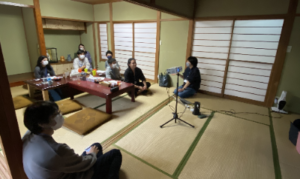
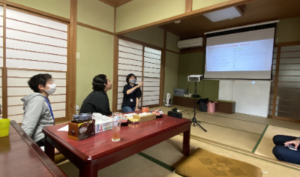
On the first day of the camp, there was a group work session on the topic of “dairy farming,” which the participants had requested in their post-study. The participants’ presentations were fuller and more impressive than usual, probably because, unlike the online sessions, there was more time to spare and it was easier to see everyone’s face and talk to each other. In addition, during question time, a small question from a participant triggered a new discussion that led to a new discussion among everyone.
During the break, everyone compared three kinds of milk, including Urahoro-produced milk, and enjoyed Urahoro sweets. In the drinking comparison, all participants said Urahoro milk was the best tasting. For the evening meal, we chose Peruvian dishes to suit the participants’ Peruvian roots. The participants asked the mothers in advance for pointers, and they were very helpful in instructing us on the process and tasting the dishes. It was a great opportunity to see the individuality of the participants outside of their studies, which was another benefit of this camp.
During the chatting time after dinner, participants asked questions to adults and seniors about their career paths, and heated discussions ensued. A little ambition of mine, thinking that it might still be difficult for middle and high school students, I raised the topic of “having immigrant backgrounds” and identity, which can be a major concern when choosing a career path. Each participant took it seriously.
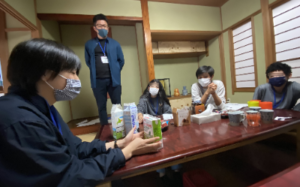
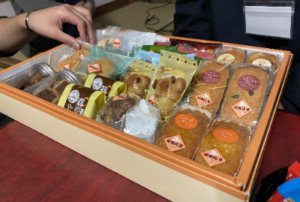
On the second day, everyone watched recordings of past programs, made albums, and wrote reflections on the current year and goals for the next year. Once again, we, the staff, were able to notice how much the participants had grown.
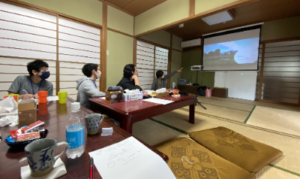
For the future
With the support and help of many people, the first year of the Mirai Challenge Program came to a successful conclusion with the Kamakura camp. My original intention in planning the Mirai Challenge Program was to pass on as much of the debt I have received to my juniors as possible, but in publicizing, implementing, and crowdfunding the activities, I have received rather more. Through the Mirai Challenge, we felt that we were able to provide the participants with hints for thinking about their future, and at the same time, we also gained a lot of insight and inspiration from their hard work and growth.
The Momi Challenge Program will continue in FY2010 and beyond, and we would like to continue doing what we can to reach more junior high and high school students with immigrant background, so that they can be supported by a wider variety of people.
Reported by Li Shu

